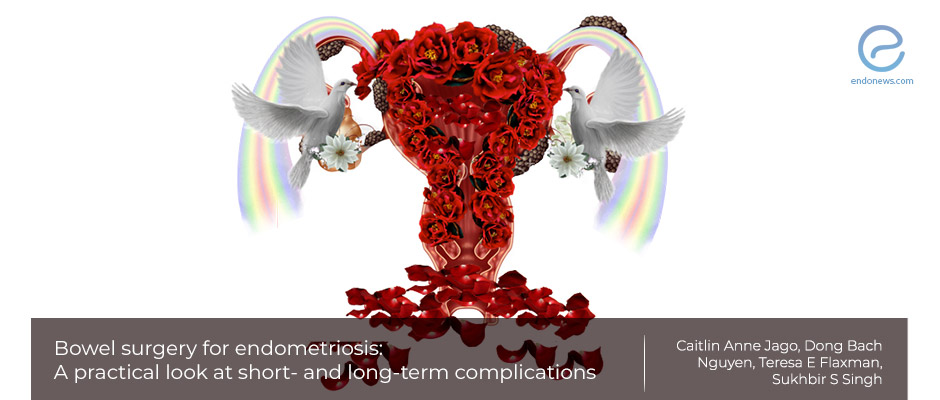Bowel surgery for endometriosis
Aug 27, 2020
A practical look at short- and long-term complications
Key Points
Highlight:
- Deep endometriosis involving the bowel lacks standardized disease definition, indications for intervention, approach to surgical management, and reporting the complications.
Background:
- Deep endometriosis involving the bowel is challenging.
- The short- and long-term risks of surgical management of deep endometriosis involving the bowel is an important accomplishment for the surgeon and essential for guiding the patients through the treatment process.
- The literature to date has inherent limitations that prevent generalizability.
Key points:
- The most important complications, specific to bowel surgery are post-operative bowel perforation, rectovaginal fistula, anastomotic leak, bleeding, and stenosis.
- Minimally invasive surgery has become the approach of choice and is associated with an overall lower complication.
- Most studies show that bowel surgery results in significant and lasting improvement in the quality of life, as well as gastrointestinal, sexual, and bladder function.
- However, surgery may not lead to complete resolution of symptoms including constipation, frequent bowel movements, dyschezia, or involuntary loss of gas or stool.
- There are a few factors that may increase the risk of complications; severe bowel stenosis (>50%) and multifocality of lesions, lesion size >3 cm, and depth of invasion to the submucosa, necessitating segmental resection.
- Removal of nodules located within 5-8cm of the anal verge is associated with a significantly increased risk of short- and long-term complications.
Conclusions:
- The management and risk assessment of deep endometriosis involving the bowel is challenging and necessitates a straightforward discussion with the patient.
- People must strive to do their best to reduce the risk by preparing appropriately prior to surgery with informed consent, proper imaging, surgical consultations with bowel experts, and optimization of our surgical techniques.
- The future direction of care for individuals with endometriosis is going to be dependent on high-quality data, reporting, and local quality assurance measures.
Lay Summary
Endometriosis is an estrogen-dependent disorder. The disease harbors various complications. Deep endometriosis involving the bowel is only one aspect of the condition that has variable phenotypic presentations and pathologic subtypes. Knowledge of the short- and long-term risks of the surgical management of endometriosis involving the bowel is a key competency for the surgeon and essential to help guide patients through the treatment process. However, the literature to date has inherent limitations that prevent generalizability.
Here, Dr. Singh group from Canada focuses on the short- and long-term reported complications of endometriosis surgery involving the bowel. This paper was recently published in the journal “Best Practice & Research Clinical Obstetrics and Gynaecology”.
The most important complications specific to bowel surgery are post-operative bowel perforation, rectovaginal fistula, and anastomotic leak, bleeding, and stenosis. Minimally invasive surgery (primary laparoscopic access) has become the approach of choice, regardless of the excision technique chosen. Indeed, according to a recent systematic review on outcomes of segmental resection for bowel rectosigmoid nodules, laparoscopy was associated with an overall lower complication rate of 15.7% compared to 26.6% for laparotomy. In general, the more invasive the type of surgery, the higher the risk of complications.
Most studies show that bowel surgery results in significant and lasting improvement in the quality of life, as well as gastrointestinal, sexual, and bladder function. However, surgery often does not lead to complete resolution of symptoms including constipation, frequent bowel movements, dyschezia, or involuntary loss of gas or stool.
There are a few factors that may increase the risk of complications, most related to the characteristics of the underlying disease. Severe bowel stenosis (>50%) and multifocality of lesions, lesion size >3 cm, and depth of invasion to the submucosa are associated with a higher risk of complications. Most importantly, studies have consistently shown that the removal of nodules located within 5-8cm of the anal verge is associated with a significantly increased risk of short- and long-term complications.
The management of deep endometriosis involving the bowel is very challenging mainly due to the lack of information. Surgery for bowel endometriosis will result in at least 10% of patients having a major complication requiring re-intervention. Therefore, people must strive to do their best to mitigate risk by preparing appropriately prior to surgery with informed consent, proper imaging, surgical consultations with bowel experts, and optimization of our surgical techniques. The future direction of care for individuals with endometriosis is going to be dependent on high-quality data, reporting, and local quality assurance measures.
"In the meantime, care for those with endometriosis involving the bowel requires a thorough preoperative plan to minimize risks and a need for early diagnosis and management of complications unique to bowel surgery," wrote the researchers.
Research Source: https://pubmed.ncbi.nlm.nih.gov/32680784/
Endometriosis Deep endometriosis Bowel surgery Complications

